Reflection on the Sahiyo Activists Retreat 2024: Zahara Kagalwalla
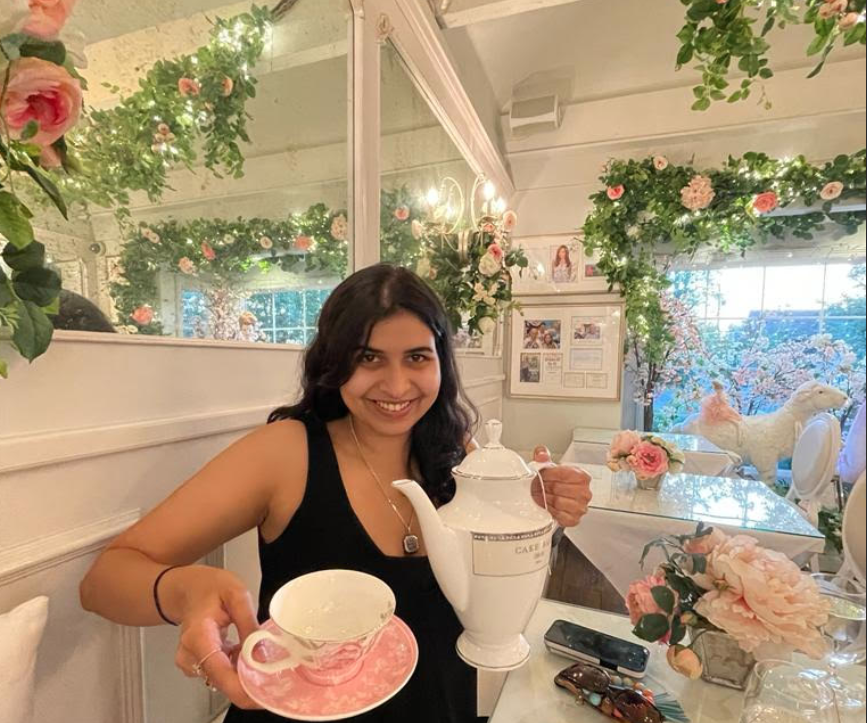
Each year, Sahiyo hosts an annual Activists Retreat to gather anti-FGC activists in a safe and supportive space, where they can engage in meaningful discussions about FGC. These retreats aim to foster collaboration, share insights, and strengthen efforts to eliminate this form of gender-based violence. The retreats include educational programs, self-care activities, and presentations from advocates engaged in anti-FGC advocacy initiatives in their communities. Below, Zahara Kagalwalla, a 2024 retreat participant, reflects on how the experience expanded her community and shares what she’s looking forward to in the next retreat. When I signed up for Sahiyo’s virtual Activist Retreat in the summer of 2024, I expected insightful discussions, but I didn’t anticipate the deep sense of connection that would emerge—even through a screen. The excitement began weeks before the retreat, when a surprise box from Sahiyo arrived at my doorstep, filled with swag, informative materials, and wellness tools—a tangible reminder that I was about to join a powerful community. When I opened the box from Sahiyo, the first thing that caught my eye was a beautifully designed coloring book—an unexpected but powerful reminder that activism isn’t just about policy; it’s also about healing. The retreat was packed with powerful sessions, but a few moments were especially memorable: Hopes for the retreat: Things started with an intimate conversation where we shared our aspirations for the retreat. Some attendees wanted more knowledge on the legal landscape surrounding FGC, while others wanted to tap into the work of other activists to learn how they may advocate against the harmful practice. I loved that we kickstarted the retreat with the topic of intentionality and how we may help each other on our journeys. Reflections from past activists: We had a viewing where we watched reflections from activists who participated in the Voices to End FGC workshop. By hearing these reflections, I was reminded of the power of storytelling in advocacy. Art time: The Sahiyo team sent coloring books and organized a guided coloring activity as a form of self-care. I loved that we could step away for a brief moment from the sometimes heavy discussions and sessions to be in solitude, yet also in the company of this community. This year, I am on the planning committee for Sahiyo’s in-person activist retreat, and I couldn’t be more excited for what’s in store. A few things I’m especially looking forward to are: The Intergenerational Dialogue Workshop: Activist Retreat planning committee members and Sahiyo volunteers, Umme and Nur, are crafting a hands-on workshop focused on how different generations perceive, discuss, and advocate against FGC. I can’t wait to explore ways to bridge generational gaps in these difficult yet crucial conversations. In-Person Connection: Virtual retreats are powerful, but there’s something special about being together in the same space. Past attendees have shared how the best moments often happen after official programming ends—late-night chats and laughter over shared meals. I’m eager to meet fellow activists face-to-face, learn about their journeys, and share pieces of my own.
Empowered and Ignited
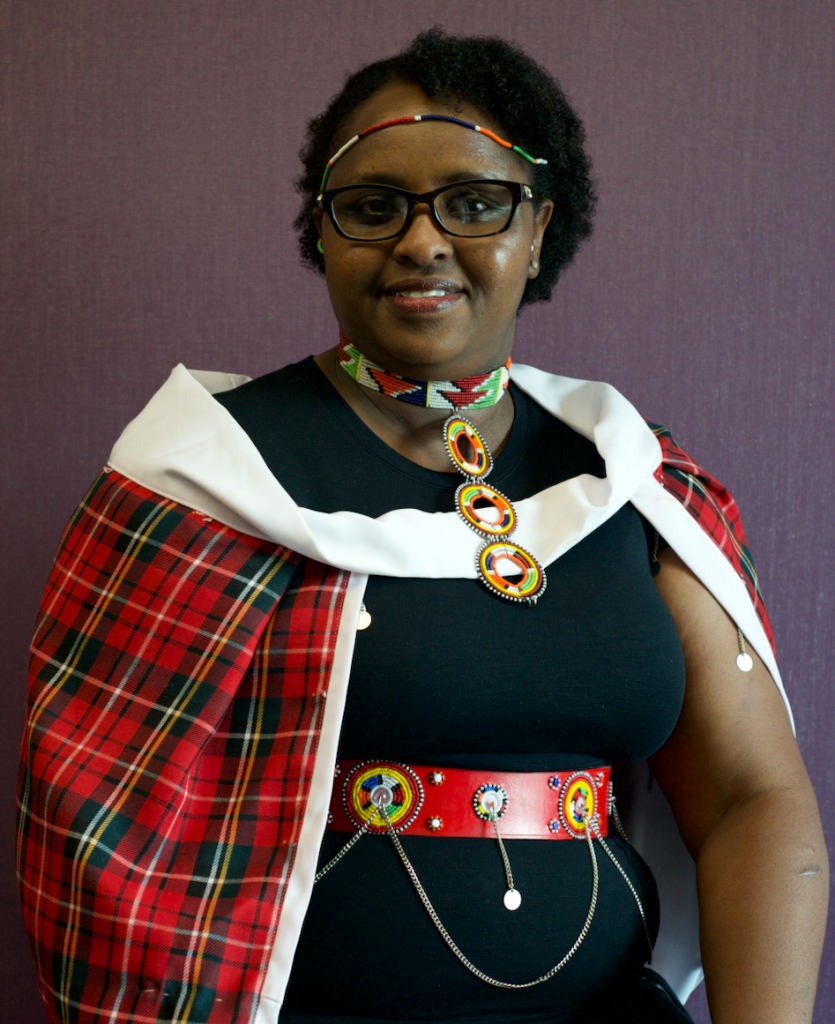
By: Emily Lerosion Each year Sahiyo hosts an annual Activists Retreat to gather anti-FGC activists in a safe and supportive space, where they can engage in meaningful discussions about FGC. These retreats aim to foster collaboration, share insights, and strengthen efforts to eliminate this harmful practice. The retreats include educational programs, self-care activities, and presentations from professionals engaged in anti-FGC advocacy initiatives in their communities. Below Emily Lerosion, who participated in the 2024 retreat, reflects on how the experience at the retreat has impacted her healing journey and advocacy work. Why did you want to attend the retreat? I wanted to attend the Activist Retreat because I believed this was a space where I could start my healing journey. It was not until I began my advocacy work that I realized I had a big problem speaking out about an act that is completely inhumane, and that robbed me of my confidence as a woman. In my life, I have been struggling with the shame that is associated with female genital cutting. I come from a community that is patriarchal. Because of this, my work as a women’s rights activist has been really difficult as I couldn’t openly speak about the practice. I was very optimistic that the retreat would help me move forward in the journey I started years ago. I wanted to interact with other survivors and learn how they have released the shame and gained acceptance of their being whole again. What have you learned or most enjoyed at the retreat? I have learned that FGM/C shouldn’t pin me down or suppress my voice, but rather inspire me to speak up against the practice to ensure future generations do not experience the same thing. I have gained so much confidence in speaking out against the practice and sharing my experience. Sharing my story, I believe, is the best way to speak out so that I can add my voice to the fight against FGM/C. I have also gained a family from the beautiful souls that I met at the retreat, and everyone’s story made me realize how strong I am, and we are as women. This inspired and motivated me even further in my advocacy work. How and why are you involved in the movement to end FGC? I am involved with the movement to end FGM/C because I believe women are complete and very valuable without the cut. I believe FGM/C is a demeaning act and needs to be ended since it deprives women of their human rights in so many ways. I am advocating to end FGM/C directly in my community both in Washington and through the Network to end FGM/C, and in my homeland of Kenya. I do this through my organization The New Dawn Pacesetter, where I act as the director uplifting the voices of women and girls. I also will attend the Commission on the Status of Women to use my voice as an advocacy tool. How do you think this retreat will inform your work as an activist? I believe this retreat will inform my work as an activist because my story will be essential in advocating for the end of this practice. This retreat will also inform my work as an activist since it has given me more strength, power, and a network. What work are you doing currently or hoping to do in the future? I am having conversations with both my friends and survivors of FGM/C here in the States and internationally. I am also holding girls mentorship camps in Kenya, mentoring girls about what their rights are and how to advocate for themselves. This is with the involvement of all community stakeholders, including parents in the practicing communities, religious leaders, schools, governments, girls at risk, and survivors just to mention a few.
Reflections on the Sahiyo Activist Retreat: A Transformative Experience
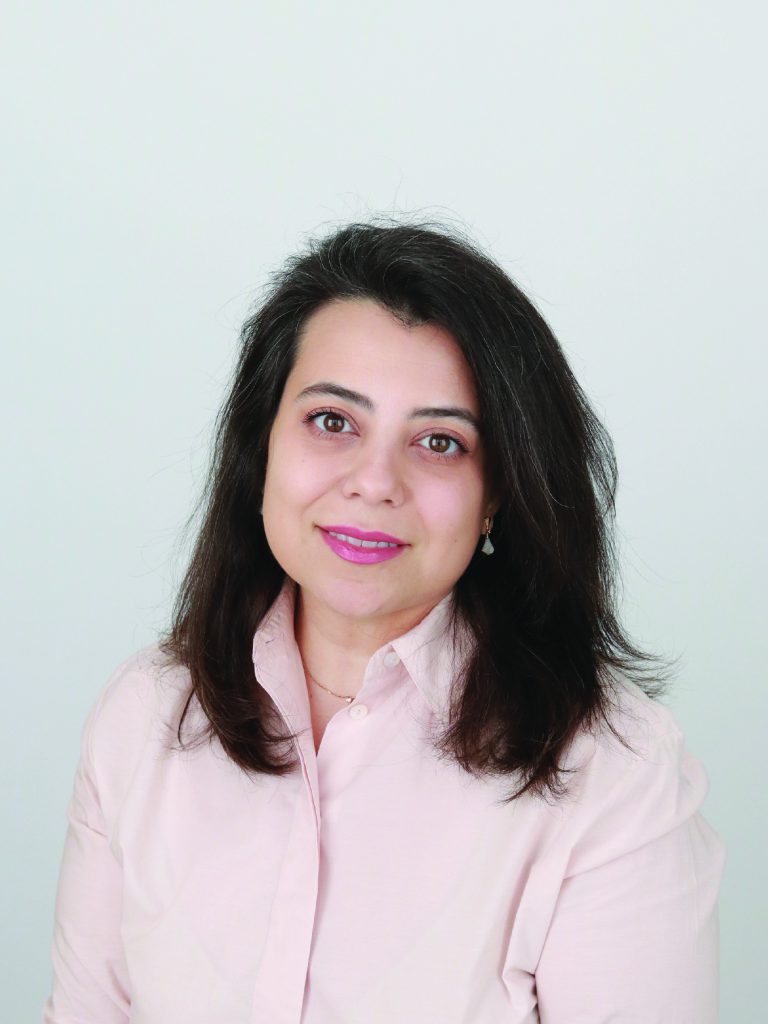
By Maryam Kamal Eldin When I first heard about the Sahiyo Activist Retreat, I knew I had to be a part of it. The retreat presented a unique opportunity for me to connect with others who shared the same commitment to ending female genital cutting (FGC) as I did. For years, I’d been passionate about advocating for survivors and raising awareness about this deeply rooted issue. My journey in this movement began in Egypt, where I worked alongside pioneering activists like Nawal El Saadawi, who fearlessly challenged the cultural and systemic roots of FGC. Being part of that movement shaped my understanding of the complexities surrounding this practice and inspired me to continue the fight on a global scale. As I’ve shifted my focus to the United States, I’ve realized that the movement here is still relatively small and in its early stages of growth, unlike in Egypt, where discussions about FGC have been ongoing for almost a century. This retreat felt like a pivotal moment for the movement against FGC in the U.S., as it brought together passionate individuals who are laying the foundation for a larger, more coordinated effort. A Space to Learn and Grow One of the most valuable aspects of the retreat was the sense of community it fostered. Meeting other activists from diverse backgrounds who are all working toward the same goal as me was incredibly inspiring. I was struck by how everyone brought their own unique perspectives and experiences, yet we all shared a common purpose: to create a world free from FGC. The workshops and discussions were particularly impactful. I learned about new strategies for community outreach, effective ways to engage with policymakers, and how to use storytelling as a powerful tool for change. I also appreciated the safe space created during the retreat, which allowed us to have honest and sometimes difficult conversations about cultural norms, challenges, and the complexities of addressing FGC within our different communities. The diversity of experiences shared during the retreat reminded me of the Egyptian women and their family members, many of whom shared harrowing stories of survival. Their resilience and courage continues to fuel my advocacy today, and it was heartening to see those same qualities reflected in the activists at the retreat. My Journey in the Movement My involvement in the movement to end FGC stems from a deeply personal place. Witnessing the impact of FGC on individuals and communities in Egypt and beyond has fueled my desire to be part of the solution. Working alongside Nawal El Saadawi taught me the importance of integrating education, advocacy, and storytelling to address this issue from all angles. In the U.S., the movement faces unique challenges. Many people are unaware that FGC even happens here, or they view it as a problem that exists only in other countries. Advocates often struggle to secure funding and attention for the issue, which makes it difficult to build momentum. This retreat, however, showed me that even though the movement in the U.S. is small, it is growing—and the commitment and passion of those involved give me hope for its future. Building on the Momentum The retreat has profoundly shaped how I view my role as an activist. It reminded me of the importance of self-care and collective support in sustaining this work. I left feeling more confident in my ability to navigate the challenges that come with advocacy and more determined than ever to push for change. Moving forward, I plan to incorporate what I’ve learned from the retreat into my ongoing projects. I am currently working on community workshops that address the intergenerational effects of FGC, and I hope to expand my efforts by collaborating with local schools and clinics to create safe spaces for survivors to share their experiences. The connections I made at the retreat will be instrumental in helping me achieve these goals. A Call to Action The Sahiyo Activists Retreat has been a transformative experience that I will carry with me for many years to come. It reminded me that while the road to ending FGC is challenging, we are not walking it alone. The movement to end FGC in the U.S. is still small, but it is growing—and it needs all of us to help it flourish. Sharing your story, educating your community, or supporting survivor-led efforts, every action makes a difference. Together, with shared knowledge, resources, and determination, we can create lasting change. If you’re considering attending a future retreat or getting involved in the movement, I encourage you to take that step. Whether you’re just beginning your journey or have been involved for years, there’s always something new to learn and ways to grow. To my fellow activists: thank you for your courage, your voices, and your unwavering commitment to this cause. Together, we are stronger.
Reflecting on Sahiyo’s 2024 Activists Retreat
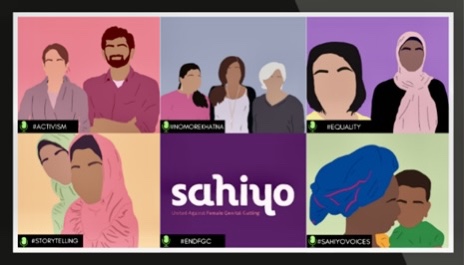
This past July, Sahiyo hosted its eighth annual Activists Retreat virtually, welcoming activists and individuals belonging to FGC-practicing communities to discuss the impact of this harmful practice in a safe and inclusive space. Typically, this program is exclusive to activists and members in the South Asian Bohra community. However, this year’s retreat piloted an inclusive approach, welcoming 14 participants from Asian Pacific Islander (API) and Southwest Asian and North African (SWANA) regions. Each participant enriched the discussions and workshops by sharing their unique experiences in anti-FGC advocacy, benefiting everyone at the retreat. The three-day virtual retreat included an agenda packed with educational programs, self-care activities, and discussion sessions for activists to reflect on their activities together as a community. Shivangi Misra, a global legal advisor from Equality Now, was a featured speaker during the retreat who presented on the “Legal Landscape of FGM/C in the U.S. Context.” Araya Casey, from the award-winning nonprofit organization, Free2Luv, conducted an art workshop tailored to the unique experiences of activists and survivors of FGC. Activists also participated in an action planning session, which offered an opportunity for activists to discuss short-term and long-term advocacy goals, as well as reflect on recent accomplishments from past retreat participants. With the virtual retreat successfully concluded, planning is now underway for the in-person, Bohra-focused retreat scheduled for early 2025. Apply to the 2025 in-person Activists Retreat! For additional details about the retreat and eligibility, visit the Activists Retreat page or email our Community Engagement Coordinator at samman@sahiyo.org.
Reflecting on the Activist Retreat

By Arefa Cassoobhoy Why did you want to attend the retreat? I had attended a virtual retreat during Covid and I was really surprised by how much I enjoyed meeting other people virtually, so that helped me feel comfortable that I would do well in an in-person group. Going to the virtual retreat also made me realize that I was ready to learn more about FGC and the history of the practice in the Bohra community. I knew that Zehra Petwa and Mariya were FGC experts when it came to talking about FGC, so I wanted to learn from them and the team how to communicate in a nonjudgmental way about the practice. I also wanted to learn how to support survivors who have gone through it. What have you learned or most enjoyed at the retreat? I was blown away by the kinship aspect of the retreat. I was born and raised in the US, and the Bohras I knew were the families that I grew up with, so it’s a pretty small close-knit group. We’re all very similar when it comes down to our backgrounds, and so at the retreat I got to meet Bohras who had different life experiences. The conversations were interesting, honest, and insightful. It was great to see how people’s ideas for activism were evolving throughout the weekend. We talked about what we thought our roles were in the community and how that relates to helping stop FGC. We also talked about how we can discuss FGC with our families and how it’s important to be able to have those real conversations. I already had compassion for the people impacted by FGC, but the retreat really helped me build a toolkit of how to talk about it and support people. Also, I think as a doctor, as a parent, and as a woman, I feel there’s an obligation that I have to protect young girls. There are a lot of bad things going on in the world, but this particular issue is close to me in a way that I feel like I can make a difference. It’s important to recognize that FGC occurs across the world and it’s not limited by religion or socioeconomic status or geography. At the retreat, we brought in a physician who I had worked with in the past who performs surgeries and provides medical care related to FGC – and there are a lot of people in Atlanta that need this medical care. She gave a great primer on some of the medical issues that come up with FGC, and that was extremely impactful. How do you think this retreat will inform your work as an activist? This retreat helped me clarify the next steps for my activism. It made me realize that I had a lot more questions about the legal part of FGC. So now this year I’m on a committee with Sahiyo working on a legal timeline to help us understand and break down what’s happening state-by-state in the US and potentially address what’s going on in other countries. This is a topic where people can feel like they are making small changes, and they may feel like it’s not going to make a difference. But when you look at these timelines, you see how people’s voices are influencing incremental changes that add up quickly. What work are you doing currently or hoping to do in the future? The most important thing that I learned from the retreat is that I want people around me to know about the topic, not in a sensational way, but in a grounded and respectful way that encourages positive change. I think it helps bring awareness to the Bohra community, because it’s so hush-hush. Being vocal about FGC allows it to come up more in day-to-day conversations. That makes it easier for people to speak out and not feel afraid or embarrassed. I plan to continue speaking out about FGC and hope people feel welcome to come talk to me about their need for healing and how to prevent girls around them from experiencing FGC. Join us at the next three-day Sahiyo Activists Retreat, taking place virtually this year from July 26-July 28. Sign up now by June 1st. Related: Join us for Sahiyo’s 8th annual Activists Retreat Rally, Revel, Repeat : A Changemakers Retreat!
Rally, Revel, Repeat : A Changemakers Retreat!
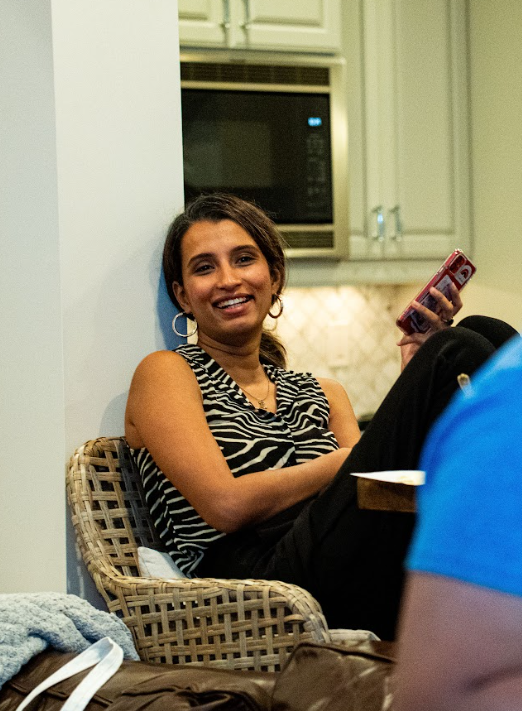
By Lubaina Plumber Remember that pivotal moment when a cause became intensely personal? That’s what happened to me when I discovered the human rights violation of female genital cutting (FGC) a few years ago. It triggered buried memories of my own experience as an eight-year-old survivor. I finally attended the transformative Sahiyo Activists Retreat in 2023, and those three days in Atlanta were sheer magic. I was instantly enveloped in a safe haven of kindred spirits where I could openly share my story without judgment. The thoughtfully planned activities included toolkits, group discussions, and personal anecdotes.All of which illuminated the nuances of the global FGC discourse. Hearing from powerful guest speakers was also incredibly inspiring. But what moved me the most were the authentic conversations with fellow activists. Trading perspectives, bonding over shared trauma, and feeling that profound sense of sisterhood – it was deeply cathartic and healing. The retreat also gave me the courage to initiate tough dialogues back home. I learned to broach the subject of FGC with a patience for ignorance, but still with a fierce determination to educate those who wrongly endorse the practice. I left the retreat with an unshakable support system and a heart full of hope for the future. Now, I’m extending an impassioned invitation to you: Join us at the next three-day Sahiyo Activists Retreat, taking place virtually this year from July 26-July 28! This is your chance to be part of a mighty community united against FGC. To find your tribe, nurture your activist spirit, and amplify your voice through empowering activities. Trust me, those few days will forge bonds that last forever and equip you with tools to create tangible change. Let’s come together, share our stories, and build a world that’s free and safe. The time has come to join the movement. Sign up now by June 1st and let’s make this year’s retreat even more impactful! Related: Join us for Sahiyo’s 8th annual Activists Retreat Passion, Purpose, Party: My take on Sahiyo’s Activists Retreat
Join Us at Sahiyos Activists Retreat
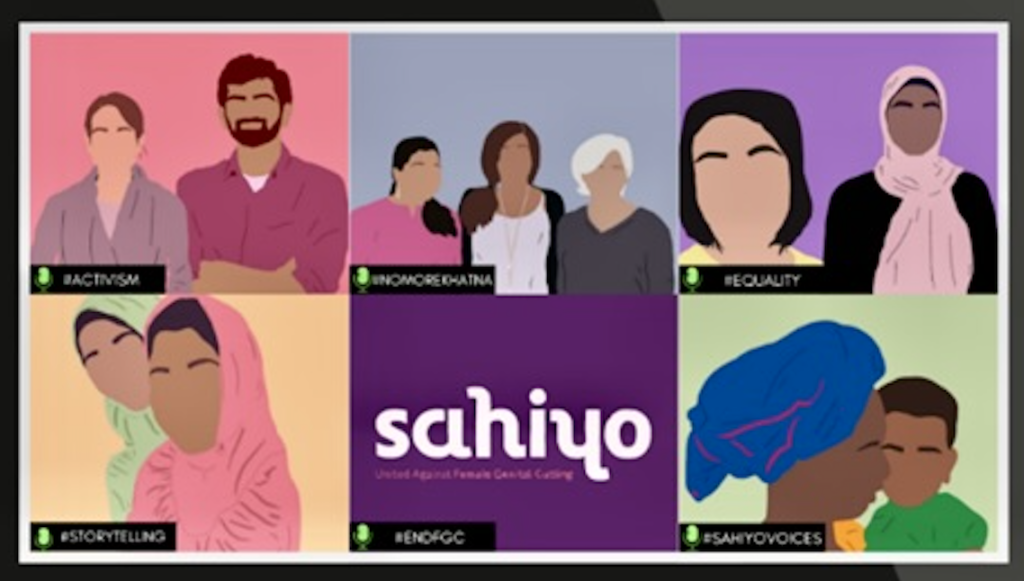
Sahiyo U.S. will host its eighth annual Activists Retreat virtually via Zoom from July 26th – July 28th, 2024. Sahiyo’s Activist Retreats bring anti-FGC activists together in a safe space to female genital cutting and work together to end the practice. Survivors, activists, and anybody interested in learning more about FGC and ending it are welcome to apply! Please submit the Activists Retreat 2024 Interest Form by Saturday, June 1st, 2024 if you’re interested. More about the retreat: When: Friday, July 26 – 5 to 6:30 pm PST/ 8 to 9:30 pm EST (1.5 hrs) via Zoom Saturday, July 27 – 8 am to 1:00 pm PST/ 11 am to 4:00 pm EST (5 hrs) via Zoom Sunday, July 28 – 8 am to 10:30 am PST/ 11 am to 1:30 pm EST (2.5 hrs) via Zoom Who: The workshop is open to anyone residing in North America. Survivors of FGC, advocates working to end the practice, and the general public interested in learning more about anti-FGC work can attend. Previously relegated to South Asian populations only, this year the workshop will include members from Asian Pacific Islander communities as well as other groups. What: The three-day retreat will include educational sessions, anti-FGC advocacy workshops, presentations, self-care activities for activists, and discussions about how to more effectively create change. The retreat will aim to achieve the following goals: Create a support system among activists working to empower their community to abandon FGC Develop a safe space for individuals to learn more about the issue of FGC Build everybody’s overall capacity to engage in activism, including sharing knowledge, resources, and networks Watch former activist retreat participant Lubaina Plumber share her story: [youtube url=”https://www.youtube.com/watch?v=4bsrA1aW-ME”] Following the workshop, Sahiyo will continue to support activists in their anti-FGC efforts as a part of our ongoing education and advocacy work to end FGM/C. If you’re interested in taking part, please fill out Activists Retreat 2024 Interest Form by Saturday, June 1st, 2024. We also invite you to visit our website to read about past retreats and learn more about the program. If you have any questions and would like more information about the retreat, please feel free to reach out to Samman at samman@sahiyo.org.
U.S. Activists Retreat 2024 Frequently Asked Questions

Who is this retreat for? Sahiyo is pleased to announce that the 2024 U.S. Activists’ Retreat to any person connected to a community or communities engaged in the practice of FGM/C and who is interested in ending the practice of FGM/C. Learn more about what the Retreat is all about from past retreat attendees who have written for our blog! Also watch: [youtube url= https://www.youtube.com/watch?v=Q6gC9F5pwI4] I am not an FGM/C survivor/I was subjected to FGM/C but I do not recall my experience/I was subjected to FGM/C but I have had no adverse effects from my experience. Am I still welcome? Yes! One does not have to be subjected to trauma or have a trauma response to have an interest in ending the practice. Everyone has a responsibility to do something and everyone interested in doing something can benefit by meeting with others who want to take action and learn more about what can be done. How much does it cost to attend the Retreat? There are no fees to attend Sahiyo’s Activists Retreat. Retreat registration is completely free and the virtual nature of the 2024 U.S. Retreat means that Retreat attendees should not incur any travel costs to attend the Retreat! How do I sign up for the Retreat? You can find our 2024 Activists’ Retreat interest form linked [HERE]! First-time attendees may be reached out to by a Sahiyo volunteer or Activists’ Retreat Planning Committee member for an informal phone or Zoom conversation regarding the Retreat and to answer any additional conversations you may have. We hope to hear from you! Is it possible to attend the retreat for just a single day? The purpose of the Activists Retreat is to allow activists to get together over the course of an entire weekend to build community, find support, and plan for future activism to end FGM/C. We ask that retreat attendees be able to attend all three days of the retreat in order to participate in all of the events, discussions, and presentations we have planned. We understand that a three-day virtual retreat may feel like an intense commitment, but we assure all prospective attendees that there will be many breaks and moments for self-care built in to make the Virtual Retreat an enjoyable, healing experience of community-building and learning. What should I bring to the Activists Retreat? Bring yourself, an internet connection, and your enthusiasm! What sorts of things will I learn at the Activists Retreat? A more complete agenda of events will be released to all Retreat Attendees closer to the date of the event. At this time, Retreat Attendees can expect to meet other activists, speak about their experiences as activists, and also learn from guest speakers. We will also have discussions about future activism, community building, and the Sahiyo Activists’ Toolkit. Learn more about Activists Retreat by visiting our blog and hearing from past participants themselves. Do you have more questions? Email Samman Masud at Samman@sahiyo.org today!
A Space to Belong: My Reflection on the 2023 Activist Retreat
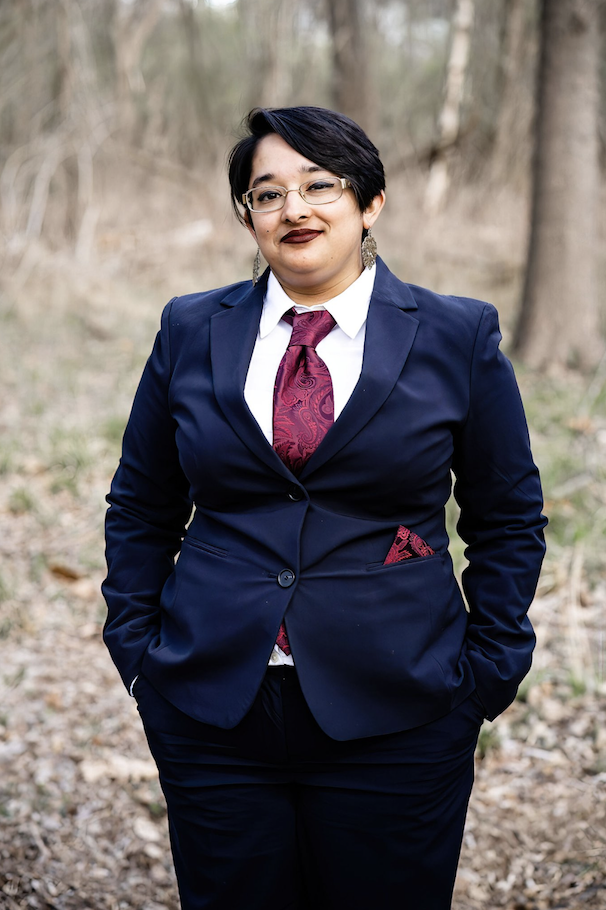
By: Umme Kulsoom Arif Pronouns: they/them Age: 29 Why Did You Want To Attend The Activist Retreat? I attended the Activist Retreat for the first time virtually in 2022, and it was a really affirming experience over those three days. However, I was really excited for an in-person retreat, especially because I had not really interacted with other Bohras who had experienced FGM/C or were even open to talking about the practice. I wanted to meet others who are doing the work that I was doing. I’ve always treated the Activist Retreat as a part of the healing of my inner child and as a part of my journey through the five stages of grief. For the first year I attended, I was in the stage of anger over what had happened to me. During the second year, it was about forgiveness, because my mother and I have had some conversations about khatna since that first retreat. What Have You Learned or Most Enjoyed at This Retreat? I really was blown away by the sheer scale and range of ages of a lot of people. I’ve always thought that FGC activism was a young person’s job. Our generation was doing the work, because previous generations had ostensibly failed us. So I was really blindsided – yet also impressed and pleased to see – that we had moms and grandmothers in the space talking about how they prevented their daughters from being cut, or they themselves were saved from it. Learning that this work had been going on for longer than I have been alive was one of the most beautiful things to hear and just really empowering. Why Are You Involved in the Movement Against Female Genital Cutting? I was five when I was cut, and I was 19 when I found out. At the time that I found out I had been cut, I had one younger cousin and she was also cut despite my family’s best attempts to prevent it from happening. For me, it’s become important to change the narrative around the issue because even if our families try to prevent it from happening, it still happens to those we love. That realization was really powerful and frustrating for me, because we deserve better out of our culture and our faith. It’s also important for me as somebody who sees how much my mom loves being a Bohra, to make it something that she doesn’t have to feel guilty or justify being because of the practice. How Do You Think That This Retreat Will Inform Your Work as an Activist? We had some interesting conversations at the retreat, especially around the Detroit case, and it forced me to process a lot of empathy for those who unfortunately do practice FGM/C. I also had the realization that the practice almost leads to a sort of cult-like mentality. As much as we know that “do no harm” from doctors is part of their oath, the harm of FGM/C does not seem to be seen as harm. That has changed a lot of my anger towards the culture, and it has just forced me to be a little bit kinder in thought to those who still support and practice it — especially as we are trying to change their minds. What Work Are You Doing Currently or Are Hoping to Do In the Future? I’m working on presenting a paper for the Association for Asian Studies Conference on March 14-17. It’s about the intersection of queerness and FGM/C, and what it means to be a non-binary survivor of FGM/C in a space that is incredibly female-focused. One of the things I processed at the retreat was that these spaces— despite the fact that I use they/them pronouns— are where I am most often referred to as a woman. That’s because most people consider the practice to be centered around womanhood and femininity. As I don’t engage with womanhood in a traditional manner, this can be difficult. So my work is centered around trying to reframe it for myself and other non-binary survivors. The harm was done to us was because of a perception of womanhood that was forced upon our bodies. And therein lies the second injustice of FGM/C for non-binary survivors – the denial of our ability to choose our own identities over the one that is placed upon us. That’s what my paper is tackling. How Did This Second Retreat Make You Feel? I felt empowered. The retreat always makes me feel powerful and I find myself leaving with a lot of clarity for what my next steps for my activism are in the coming year. One of my big goals that came out of the retreat was finishing the paper, as I mentioned previously. Also, finding others who had survived FGM/C – speaking to these people who had such varied lives, that weren’t just centered around being a survivor – makes me feel like we’re not alone. There is a line by Rumi, the poet, “Ours is not a caravan of Despair”, and that line comes to me every time I think about the retreat—this is not the Caravan of Despair that we think it is when we’re alone. Do You Have Anything Else You Would Like to Share? Something You Can Share With Other People Who Might be Interested in The Retreat? If you are ever afraid that you’re not going to fit in because you don’t fit the traditional mold of a survivor—you will. Everybody is very welcoming. Related: Volunteer spotlight: Umme Kulsoom Arif On being a Nonbinary Survivor of FGM/C [youtube url=”https://www.youtube.com/watch?v=WfSUlv7Zmto”]
Join us for Sahiyo’s 8th annual Activists Retreat
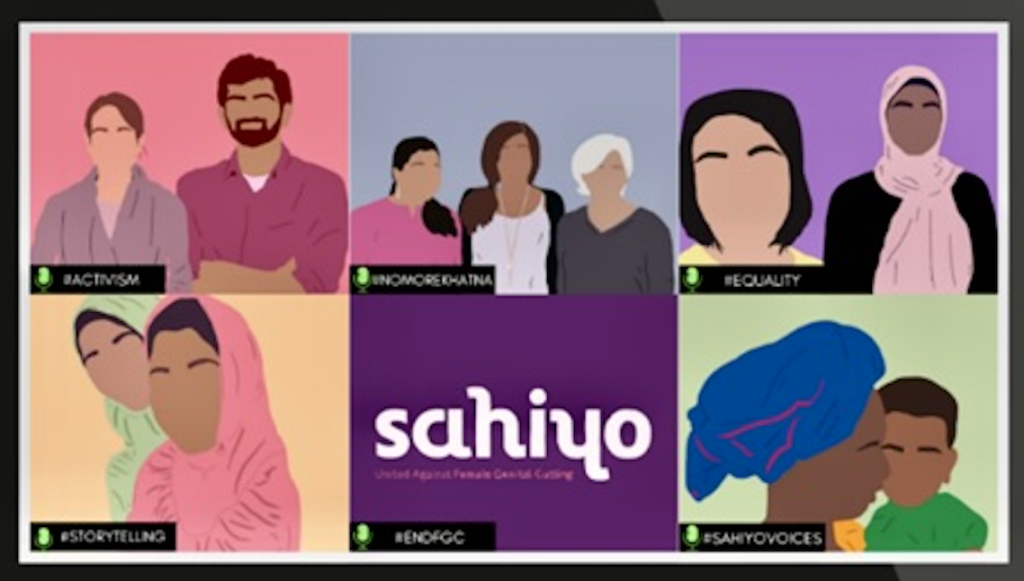
From July 26 – July 28th, 2024, Sahiyo U.S. will host its 8th annual Activists Retreat virtually via Zoom. Sahiyo hosts an annual Activist Retreats to bring anti-FGC activists together in a safe space and discuss the issue of female genital cutting, in an effort to collaboratively work towards ending the practice. Since 2018, over 85 people have participated in the retreat. Participants of the retreat are people speaking out against FGC — who work either publicly or anonymously — to raise community awareness about the need to end this harmful practice. Survivors, activists and anyone committed to ending FGC and interested in learning more about the issue is welcome to apply! More about the retreat: When: The virtual sessions will take place via Zoom on the following dates and times: Friday, July 26 – 5 to 6:30 pm PST/ 8 to 9:30 pm EST (1.5 hrs) Saturday, July 27 – 8 am to 1:00 pm PST/ 11 am to 4:00 pm EST (5 hrs) Sunday, July 28 – 8 am to 10:30 am PST/ 11 am to 1:30 pm EST (2.5 hrs) Who: The workshop is open to anyone residing in North America. Survivors of FGC, advocates working to end the practice and the general public interested in learning more about anti-FGC work are invited to attend. Previously relegated to South Asian populations only, this year the workshop will include members from Asian Pacific Islander communities as well as other groups. What: The 3-day retreat will include educational sessions on FGC and anti-FGC advocacy workshops, speaker presentations, self-care activities for activists and discussions to educate participants about FGC and how to better advocate to bring an end to this practice. The retreat will aim to achieve the following goals: Create a support system among activists working to empower their community to abandon FGC Develop a safe space for individuals to learn more about the issue of FGC Build individuals’ overall capacity to engage in activism, including sharing knowledge, resources, and networks Following the workshop, Sahiyo will support activists in their anti-FGC efforts and help them sustain post-retreat engagement as part of our ongoing education and advocacy work to end FGM/C. If you’re interested in taking part, please fill out Activists Retreat 2024 Interest Form by Saturday, June 1, 2024. We also invite you to visit our website to read reports from past retreats and learn more about the program. If you have any questions and would like more information about the retreat, please feel free to reach out to Samman at samman@sahiyo.org.
